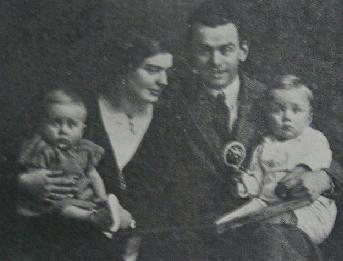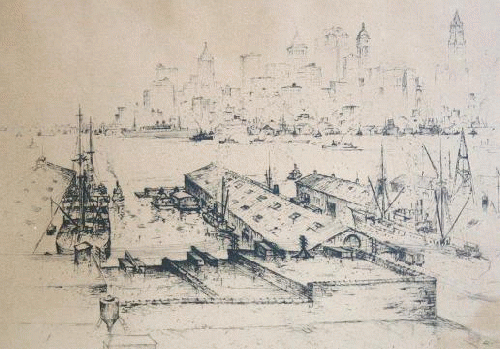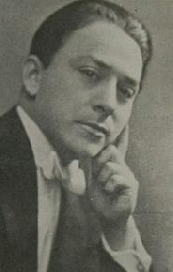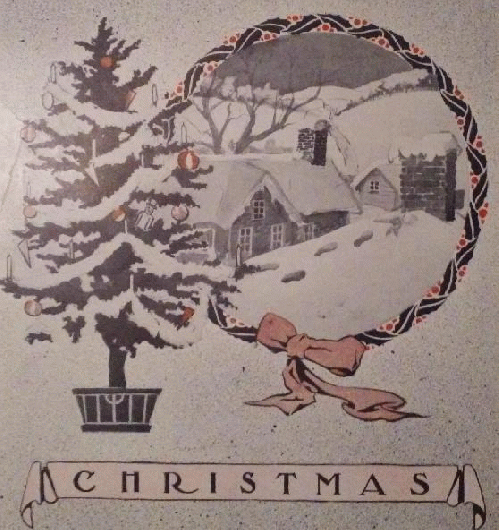
Illustration by John La Gatta from the cover of a 1913 edition of Brooklyn Life magazine.
(Image by Brooklyn Life magazine) Details DMCA
Copyright 2018 by Peter Duveen. All rights reserved.
The frigid air of late fall had long overtaken the merely threatening cold spells of November. Calvin Coolidge was re-elected to the presidency over his rivals, just as Herbert had predicted in his editorials. The unexcelled operatic composer, Giacomo Puccini, passed away from stomach cancer in the midst of working on his finale, Turandot--an event sure to have triggered reverberations in musical circles worldwide. Closer to home, Anton Schutz, who was hard at work in Manhattan as chief assistant to Joseph Pennell at the Art Student's League, was collecting his etchings from the Neighborhood club after a month-long exhibit there. Schutz, who was two years Rembski's senior - 30 years old - emigrated from Germany with his wife and children in the early 1920s to track down Pennell, who was considered America's foremost etcher, and learn what he could from him.
Schutz's position in the late war was as an officer on the German side. That this did not play as badly in states as one might expect, considering Schutz's participation in what may have amounted to the deaths of American soldiers, is a testament to the liberality of this country, and of Brooklyn Heights in particular, where he settled with his wife and two children. His association with Pennell as the elder artist's right-hand man at the Arts Students League had been of great benefit to both, and he was already achieving a strong reputation on his own. He had entered his work at the International Exhibition of Etchers at the Anderson Galleries in Manhattan, and his Neighborhood Club show had been a success as well, with Brooklyn Heights natives snatching up his etchings of local buildings.
Schutz would in the coming years establish the New York Graphic Society, specializing in art reproductions. In fact, he would become so busy with the primary work of the society, which at least managed to earn him and his family a middle-class income, that he would lay aside his etching tools for good. But the legacy of his work remains. His beautifully rendered and breathtaking views of the city and of Brooklyn are in many public and private collections.
As Schutz moved his works out of the club, Robert J. Wickenden was moving his work in. Bob and Stanis had established a warm relationship, and Stanis completed Wickenden's portrait on time for its use as an illustration for Brooklyn Life in conjunction with the artist's December show. The portrait is a strikingly good one when compared to one done a decade earlier by another artist, and is a testimony to the warmth and camaraderie generated between himself and Stanis in the short time they had known each other.
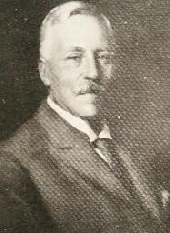
Detail, portrait of R.J. Wickenden by Stanislav Rembski.
(Image by Brooklyn Life magazine) Details DMCA
Wickenden's paintings reflected 19th-century stylistic trends that had outlived their immediate appeal to many collectors. But they were still stunningly beautiful in terms of his use of color and choice of subjects. It was thus no surprise that an impressive roster of Brooklyn Heights celebrities showed up at the private view in early December. Interestingly enough, Stanis did not make an appearance at the opening, although he no doubt viewed the paintings before the exhibition's close at the end of the month.
In attendance, however, was Raul Paniagua, another debonair 30-ish figure in the cultural lineup of up-and-coming Heights personalities. As the perennial Brooklyn cheerleader, Corrie had encouraged this brilliant Guatemalan pianist and composer to settle in Brooklyn, and he was already scoping out the local social scene.
At the Neighborhood Club, Raul plied his charm while conversing enthusiastically with Corrie and Esther about himself and his accomplishments, interspersed with comments about the latest neighborhood news. Armed with her own agenda in mind, Corrie was incessantly employing her charismatic enthusiasm in the service of turning Brooklyn Heights into a draw for artists, performers, and persons of letters that would outflank the very competitive Greenwich Village as a cultural destination. To lighten up the affair, Corrie persuaded Robert to bring aboard as helpers a contingent of 10 Adelphi Academy high school women, led by Wickenden's teenage daughter, Marguerite Heloise. This must have certainly lent an element of grace to the occasion.
Corrie later commented on a painting of one of her favorite Brooklyn Heights vignettes. "The one called 'Sunrise: Old Brooklyn," she wrote, "shows you the back of one of the oldest wooden houses left on Willow Street, as the artist sees it. The warm pink of the early sun is on it, and an ailanthus tree and a brick wall with a vine growing over it make a lovely dark contrast. We could not help thinking as we gazed at it, how true it must be that if beauty is so undoubtedly in every single thing around us, why, of course, heaven is there too, if we would only use our stupid unthinking eyes. Most of us only look out of the window to see if we had better take an umbrella or not." Such a comment betrayed Corrie's flirtation with the mystical, and perhaps even her religious upbringing in a household heavily influenced by the Episcopal Church, and Grace Church on the Heights in particular, in which her family had played such an important part.
As the Christmas season was nearing dead heat, everything else took back stage to preparations on the community and family level for that important celebration. But the customary Christmas cheer was threatened by the infamous Volstead act, which made the possession, sale and consumption of alcoholic beverages a criminal offense. No issue could have more inflamed Herbert Henshaw than this one, and he was constantly railing against the act and its malicious and unintended side effects in his weekly editorials. He wrote:
"[T]he attempt to prevent speculators of foreign nations from supplying the normal American demand for a commodity in universal use, has opened the way to flagrant violations of perfectly reasonable and justifiable laws of the United States. The customs authorities have apparently just awakened to, or been apprised of, the fact that not only are alcoholic beverages being smuggled into the country in vast quantities, but narcotic drugs and aliens in violation of the narcotic drug and immigration laws. If it were not for the Volstead law there would be no rum fleet hovering at the 12-mile limit, and if there were no rum fleet the smuggling in of drugs into the country and aliens would be incomparably more difficult. But the smugglers who are merely violating the Volstead law are doing nothing morally reprehensible, providing the liquor they sell is what it is represented to be, and they are defrauding no one.
"The other two forms of smuggling, however, are crimes in every sense of the word, for those who engage in them are engaged in what they themselves recognize perfectly well as criminal activities, though of the two, the trade in drugs is by far the more condemnable, since it is catering to an abnormal, perverted, degrading and ruinous vice and encouraging the spread of it, while the other is merely defying a law enacted in pursuance of a national policy. But in every way the prohibition law is working to break down rational law and disintegrate our moral fibre. If the Volstead law is accomplishing anything toward the abatement of alcoholism it is by converting chronic drunkards into drug addicts or making their last state worse than their first."
Herbert could not forgive the federal government for what he saw as its arrogant imposition of a ban on what was a thousands-year-old tradition of humankind. But his take on other forms of intoxication shows that, with the proliferation of drug use in our day, the issues he dealt with have hardly changed in 94 years since he wrote those words.
Brooklyn Heights was not what one might call a "dry" community. Although generally law abiding, the residents had a keen appetite for liquor, and nothing stopped them from getting their fair share. That would contribute to their Christmas joy as preparations for the celebration of the Savior's birthday reached a fevered pitch. The Henshaw household was no exception. Also fueling the Henshaws' fervor for the upcoming festivities was their connection with all things Episcopal. This included a strong tradition of Christmas celebrations. Lately, their sympathies had gravitated to the Swedenborgian Church, however, and events there took center stage, in contrast with the much closer Grace Church on the Heights, which, while having a deeper connection with the Henshaw family historically, had fallen into disfavor among family members, perhaps due to its stand on such matters as the virgin birth and prohibition.
Young Nancy's enthusiasm for the holiday was augmented by the growing presence of arriving family members. This Christmas for the Henshaw clan would be a major family reunion of sorts. Certainly, Sarah and Clarence Childs were on their way from Minnesota to join with the family, but perhaps more importantly for them, to see their son George and hear a first-hand account of what it was like to be employed as an artist at the American Museum of Natural History. Valdemar, who had moved to Florida with his wife, would certainly not miss an opportunity to join in with the Henshaw family Christmas fun, whatever trouble and expense it would be to make the trip to New York. It was to be somewhat of a rare event in terms of family participation, although throughout the year, the Henshaws kept in constant communication with each other by mail and telephone. Walter Henshaw and his wife, living as they did on the St. Bernard School campus in New Jersey, only a few hours distant by train and subway, would also more than likely also be an important part of the festivities.
As the family was in the midst of intensive preparations for the main event, Corrie wrote, in Willie Winkie's voice, of course, in her weekly column: "As I sit here, hard at my editorial work, I notice that there is a great deal of bustle and excitement in the house. The boss (Corrie) is thrashing around with a step ladder, which she puts excitedly down at the windows, then dashes up and hangs stuff up on rods that keep out half the light, while Moses, who takes care of the furnace and has a strong Southern accent, flies on ahead of her with a pail of water, washing the windows all off and polishing them so as to let in the light.
(Note: You can view every article as one long page if you sign up as an Advocate Member, or higher).


